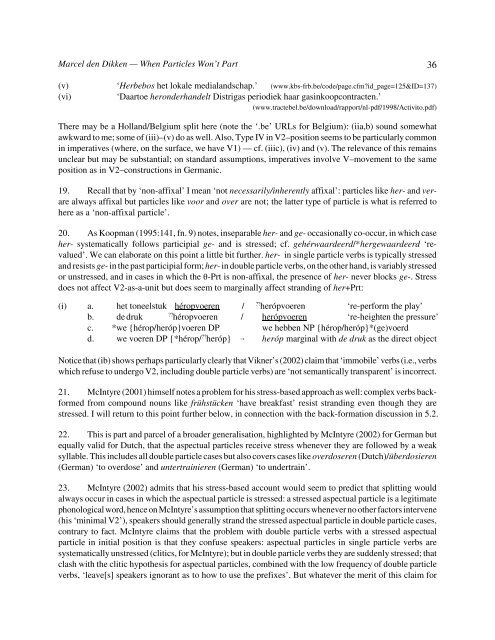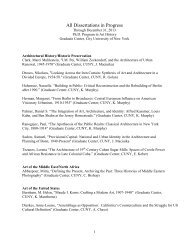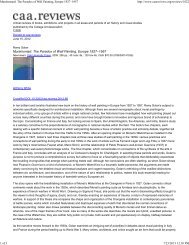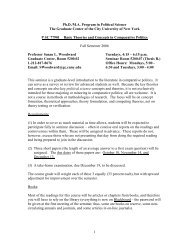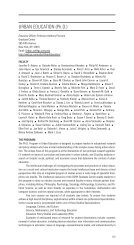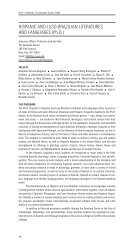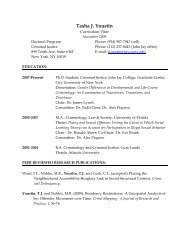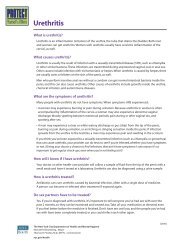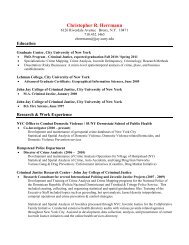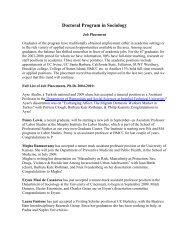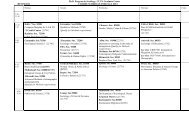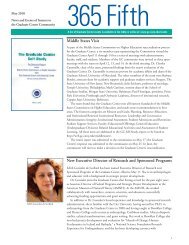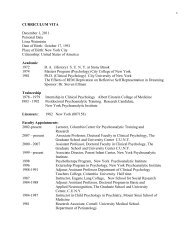When Particles Won't Part - CUNY Graduate Center
When Particles Won't Part - CUNY Graduate Center
When Particles Won't Part - CUNY Graduate Center
Create successful ePaper yourself
Turn your PDF publications into a flip-book with our unique Google optimized e-Paper software.
Marcel den Dikken — <strong>When</strong> <strong><strong>Part</strong>icles</strong> Won’t <strong>Part</strong><br />
(v) ‘Herbebos het lokale medialandschap.’ (www.kbs-frb.be/code/page.cfm?id_page=125&ID=137)<br />
(vi) ‘Daartoe heronderhandelt Distrigas periodiek haar gasinkoopcontracten.’<br />
(www.tractebel.be/download/rapport/nl-pdf/1998/Activito.pdf)<br />
There may be a Holland/Belgium split here (note the ‘.be’ URLs for Belgium): (iia,b) sound somewhat<br />
awkward to me; some of (iii)–(v) do as well. Also, Type IV in V2–position seems to be particularly common<br />
in imperatives (where, on the surface, we have V1) — cf. (iiic), (iv) and (v). The relevance of this remains<br />
unclear but may be substantial; on standard assumptions, imperatives involve V–movement to the same<br />
position as in V2–constructions in Germanic.<br />
19. Recall that by ‘non-affixal’ I mean ‘not necessarily/inherently affixal’ : particles like her- and verare<br />
always affixal but particles like voor and over are not; the latter type of particle is what is referred to<br />
here as a ‘non-affixal particle’ .<br />
20. As Koopman (1995:141, fn. 9) notes, inseparable her- and ge- occasionally co-occur, in which case<br />
her- systematically follows participial ge- and is stressed; cf. gehérwaardeerd/*hergewaardeerd ‘revalued’<br />
. We can elaborate on this point a little bit further. her- in single particle verbs is typically stressed<br />
and resists ge- in the past participial form; her- in double particle verbs, on the other hand, is variably stressed<br />
or unstressed, and in cases in which the 2-Prt is non-affixal, the presence of her- never blocks ge-. Stress<br />
does not affect V2-as-a-unit but does seem to marginally affect stranding of her+Prt:<br />
(i) a. het toneelstuk héropvoeren / ?? herópvoeren ‘re-perform the play’<br />
b. de druk ?? héropvoeren / herópvoeren ‘re-heighten the pressure’<br />
c. *we {hérop/heróp}voeren DP we hebben NP {hérop/heróp}*(ge)voerd<br />
d. we voeren DP {*hérop/ ?? heróp} 6 heróp marginal with de druk as the direct object<br />
Notice that (ib) shows perhaps particularly clearly that Vikner’ s (2002) claim that ‘immobile’ verbs (i.e., verbs<br />
which refuse to undergo V2, including double particle verbs) are ‘not semantically transparent’ is incorrect.<br />
21. McIntyre (2001) himself notes a problem for his stress-based approach as well: complex verbs backformed<br />
from compound nouns like frühstücken ‘have breakfast’ resist stranding even though they are<br />
stressed. I will return to this point further below, in connection with the back-formation discussion in 5.2.<br />
22. This is part and parcel of a broader generalisation, highlighted by McIntyre (2002) for German but<br />
equally valid for Dutch, that the aspectual particles receive stress whenever they are followed by a weak<br />
syllable. This includes all double particle cases but also covers cases like overdoseren (Dutch)/überdosieren<br />
(German) ‘to overdose’ and untertrainieren (German) ‘to undertrain’ .<br />
23. McIntyre (2002) admits that his stress-based account would seem to predict that splitting would<br />
always occur in cases in which the aspectual particle is stressed: a stressed aspectual particle is a legitimate<br />
phonological word, hence on McIntyre’ s assumption that splitting occurs whenever no other factors intervene<br />
(his ‘minimal V2’ ), speakers should generally strand the stressed aspectual particle in double particle cases,<br />
contrary to fact. McIntyre claims that the problem with double particle verbs with a stressed aspectual<br />
particle in initial position is that they confuse speakers: aspectual particles in single particle verbs are<br />
systematically unstressed (clitics, for McIntyre); but in double particle verbs they are suddenly stressed; that<br />
clash with the clitic hypothesis for aspectual particles, combined with the low frequency of double particle<br />
verbs, ‘leave[s] speakers ignorant as to how to use the prefixes’ . But whatever the merit of this claim for<br />
36


